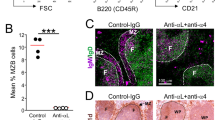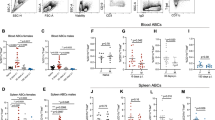Abstract
Prion diseases are typically initiated by infection of peripheral sites, as in the case of bovine spongiform encephalopathy, new variant Creutzfeldt-Jakob disease 1 , kuru and most cases of iatrogenic Creutzfeldt-Jakob disease. In mouse scrapie, prion infectivity accumulates in lymphoid organs, and the absence of mature B lymphocytes prevents peripherally administered prions from inducing central nervous system disease 2 . We have now assessed whether expression of the cellular prion protein, PrP C , is required for B lymphocytes to mediate neuroinvasion. We found that repopulation of SCID and Rag -1 -/- mice with fetal liver cells from either PrP-expressing or PrP-deficient mice and from T-cell deficient mice, but not from B-cell deficient mice, is equally efficient in restoring neuroinvasion after intraperitoneal inoculation of scrapie prions. These results indicate that cells whose maturation depends on B cells or their products, such as follicular dendritic cells, may enhance neuroinvasion. Alternatively, B cells may transport prions to the nervous system by a PrP-independent mechanism.
This is a preview of subscription content, access via your institution
Access options
Subscribe to this journal
Receive 12 print issues and online access
$209.00 per year
only $17.42 per issue
Buy this article
- Purchase on Springer Link
- Instant access to full article PDF
Prices may be subject to local taxes which are calculated during checkout


Similar content being viewed by others
References
Weissmann, C. & Aguzzi, A. Bovine spongiform encephalopathy and early onset variant Creutzfeldt- Jakob disease. Curr. Opin. Neurobiol. 7, 695–700 (1997).
Klein, M.A. et al. A crucial role for B cells in neuroinvasive scrapie. Nature 390, 687–690 (1997).
Fraser, H. & Dickinson, A.G. Pathogenesis of scrapie in the mouse: the role of the spleen. Nature 226, 462–463 (1970).
Kitamoto, T., Muramoto, T., Mohri, S., Doh ura, K. & Tateishi, J. Abnormal isoform of prion protein accumulates in follicular dendritic cells in mice with Creutzfeldt-Jakob disease. J. Virol. 65, 6292–6295 (1991).
Lasmezas, C.I. et al. Immune system-dependent and -independent replication of the scrapie agent. J. Virol. 70, 1292– 1295 (1996).
Kitamura, D., Roes, J., Kuhn, R. & Rajewsky, K. A B cell-deficient mouse by targeted disruption of the membrane exon of the immunoglobulin mu chain gene. Nature 350, 423– 426 (1991).
Büeler, H.R. et al. Mice devoid of PrP are resistant to scrapie. Cell 73, 1339–1347 (1993).
Blättler, T. et al. PrP-expressing tissue required for transfer of scrapie infectivity from spleen to brain. Nature 389, 69– 73 (1997).
Cashman, N.R. et al. Cellular isoform of the scrapie agent protein participates in lymphocyte activation. Cell 61, 185– 92 (1990).
Bosma, M.J. & Carroll, A.M. The SCID mouse mutant: definition, characterization, and potential uses. Annu. Rev. Immunol. 9, 323–50 (1991).
Mombaerts, P. et al. RAG-1-deficient mice have no mature B and T lymphocytes. Cell 68, 869–77 (1992).
Kosco, M.H., Pflugfelder, E. & Gray, D. Follicular dendritic cell-dependent adhesion and proliferation of B cells in vitro. J. Immunol. 148, 2331–2339 (1992).
Gonzalez, M., Mackay, F., Browning, J.L., Kosco-Vilbois, M.H. & Noelle, R.J. The sequential role of lymphotoxin and B cells in the development of splenic follicles. J. Exp. Med. 187, 997–1007 (1998).
Fraser, H. et al. Replication of scrapie in spleens of SCID mice follows reconstitution with wild-type mouse bone marrow. J. Gen. Virol. 77, 1935–1940 (1996).
Philpott, K.L. et al. Lymphoid development in mice congenitally lacking T cell receptor alpha beta-expressing cells. Science 256, 1448–1452 (1992).
Prusiner, S.B. et al. Measurement of the scrapie agent using an incubation time interval assay. Ann. Neurol. 11, 353– 358 (1982).
Fischer, M. et al. Prion protein (PrP) with amino-proximal deletions restoring susceptibility of PrP knockout mice to scrapie. EMBO J. 15, 1255–1264 (1996).
Brandner, S. et al. Normal host prion protein necessary for scrapie-induced neurotoxicity. Nature 379, 339–343 (1996).
Hill, A.F., Zeidler, M., Ironside, J. & Collinge, J. Diagnosis of new variant Creutzfeldt-Jakob disease by tonsil biopsy. Lancet 349, 99 (1997).
Hilton, D.A., Fathers, E., Edwards, P., Ironside, J.W. & Zajicek, J. Prion immunoreactivity in appendix before clinical onset of variant Creutzfeldt-Jakob disease. Lancet 352, 703–704 (1998).
Korth, C. et al. Prion (PrPSc)-specific epitope defined by a monoclonal antibody. Nature 390, 74–77 (1997).
Büeler, H. et al. High prion and PrPSc levels but delayed onset of disease in scrapie-inoculated mice heterozygous for a disrupted PrP gene. Mol. Med. 1, 19–30 (1994).
Acknowledgements
We thank A. Burlet, M. König, and N. Wey for technical help; T. Bächi for help with confocal microscopy; K. Rajewsky for μMT mice; and M. Kosco-Vilbois for the FDC-M1 antibody. M.A.K. is supported by a fellowship of the Deutsche Forschungsgemeinschaft. This work is supported by the Kanton of Zürich, the Bundesämter für Gesundheit, Veterinärwesen, Bildung und Wissenschaft, and by grants of the Swiss National Research Program NFP38/NFP38+ to A.A., A.J.R., R.M.Z., and C.W.
Author information
Authors and Affiliations
Corresponding author
Rights and permissions
About this article
Cite this article
Klein, M., Frigg, R., Raeber, A. et al. PrP expression in B lymphocytes is not required for prion neuroinvasion . Nat Med 4, 1429–1433 (1998). https://doi.org/10.1038/4022
Received:
Accepted:
Issue Date:
DOI: https://doi.org/10.1038/4022
This article is cited by
-
Effect of co-infection with a small intestine-restricted helminth pathogen on oral prion disease pathogenesis in mice
Scientific Reports (2019)
-
Prion disease: experimental models and reality
Acta Neuropathologica (2017)
-
Immunotherapy in prion disease
Nature Reviews Neurology (2013)
-
The immunobiology of prion diseases
Nature Reviews Immunology (2013)
-
M cell-depletion blocks oral prion disease pathogenesis
Mucosal Immunology (2012)



